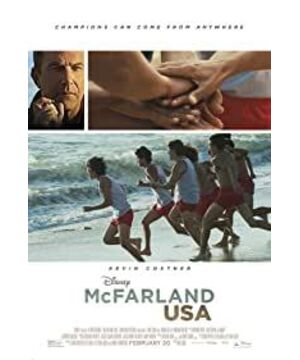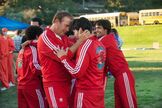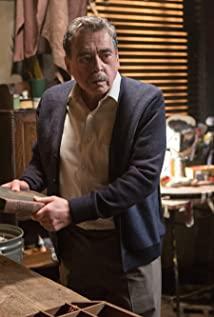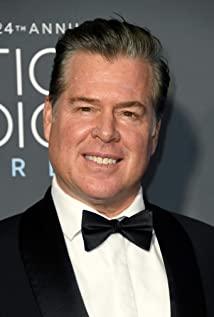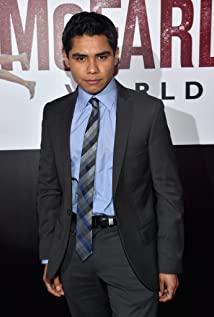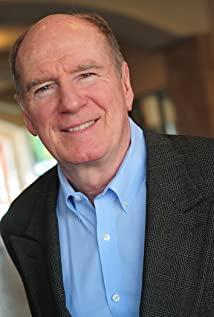The hot-tempered football coach Jim White (Kevin Costner) got into trouble. He didn't control his emotions. He beat a player in the locker room and was expelled from his high school, making it difficult to find a faculty position in a prestigious high school. Only one McFarlane High School in Southern California, a small town near Mexico, accepted him. In sunny and economically prosperous California, McFarlane is a land outside the law. Its population is dominated by Spanish-speaking Hispanics, and its residents are mostly farmers and long-term workers who rely on picking for their livelihoods. The children born here seem to be destined from the very beginning: dropping out of school early, fighting, working as a laborer, going to jail, drinking alcohol... In the eyes of the standard white American Jim White, McFarlane is a copy of Mexico.
At the insistence of his family, Coach White tried to live in McFarlane. One day, he accidentally discovered that his students had a talent: strong endurance, not afraid of heat, and good at running long distances. It happened that he was squeezed out by the football head coach, so a few outstanding students were recruited to form the first cross-country running team in McFarlane's history. However, the difficulties they face are far more than running results. Cross-country running is an upper-class sport. McFarlane's children not only lack sports equipment, but even training time cannot be guaranteed. Coach White learned from the beginning of a trail running coach, looking for sponsorship, and persuading poor parents to let their children participate in training, hoping for a better future. In the end, McFarlane, the poorest from California, defeated other excellent high schools and won the first place, and the children broke the class ceiling and entered the university.
In the film, class barriers are everywhere. The White family drove to McFarlane for the first time and looked at the scenery on both sides of the street, wondering if they were in Mexico; the fast food restaurant didn’t even have burgers, and only sold Mexican-style tacos; the school building was dilapidated, and the students either fight or truant; more importantly, except for White One is a standard white American, and the residents of McFarlane are basically Spanish-speaking Mexican immigrants or poor native Indian descent. Class issues are always accompanied by race issues. When playing against other high school teams, in front of other professionally equipped white high schools, McFarlane's children appear so short, dark, and malnourished. Poverty is the root of all this.
Americans have always been proud of the "American Dream", and McFarlane is the place where the American Dream cannot shine. The arrival of Coach White brings the possibility of change to McFarlane's children. There is a detail in the film that is very intriguing. The children's name for the coach has been changing. From the beginning of "Lao Bai", the common saying they like to say "hometown", and finally solemnly called him "coach." The change of name represents the acceptance and tolerance of the local residents of McFarlane to the White family. It also indicates that the White family continues to integrate into the local community. It is also a change in the children’s self-perception: from the beginning, it was just because of For various reasons, I was forced to join the trail running team. At the beginning, I really regarded myself as a trail running team member and looked forward to changing the trajectory of their lives and realizing their "American Dream".
In recent years, running sports in China has become more and more popular. There have been continuous marathons in various cities, and the wilder and more difficult cross-country running events have become popular. In the United States, running has been popular since the 1980s. "McFarlane" is based on the true story of the late 1980s. Coach White still lives in McFarlane, leading local young people to create the "American Dream" of trail running one after another. At the end of the film, the prototype of the characters appeared on the big screen. The spirited coach Wright was still riding a bicycle. The subtitles of the film tell us which colleges those team members went to and what occupation they are now in, which changed the destiny of working as a laborer. One of the team members named Jose also became a reporter for the Los Angeles Times. He was interviewing in Iraq at this time and did not appear in the film. This is the most touching scene of the film, because it comes from reality, and even the fact that a member of the team went into prison later is not shy about it. It really has power. It broke the ceiling of class and poverty with an iron punch. After adding this flavor, "McFarlane" is not just a bowl of ordinary chicken soup. Use a piece of Jose’s composition in the film to end this film review:
When we run, we own the earth.
We own this land, and we speak the language of birds.
No longer an immigrant, and no longer a Mexican idiot.
When we run, our souls fly and talk to the gods.
When we run, we are gods.
View more about McFarland, USA reviews


